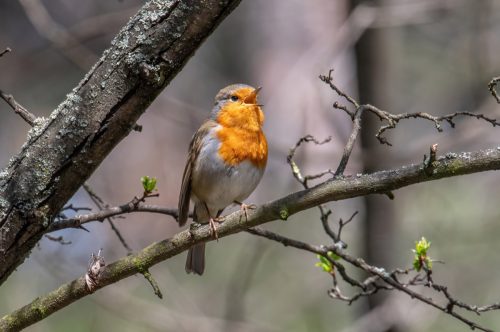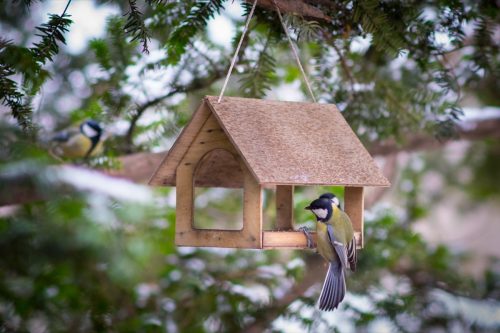Listening to Birds Can Help Relieve Depression
Twenty-three. Count ’em—23 birds in the 12 days of Christmas. Maybe this is the reason her true love gave her so many birds: Their tweets bring good cheer, and not only to ornithologists.
Singing birds are mood-boosters, according to recent research. And couldn’t most of us use a lift right about now? Read on to find out why the best place to look for happiness might be right in our own backyards—and over our heads.
READ THIS NEXT: Doing This at Night Can Boost Your Memory, New Study Says.
Depression is very common throughout the world. Roughly 280 million people suffer from the mental health disorder around the globe, according to the World Health Organization.
In the United States, 21 million adults—just over eight percent of the adult population—have experienced at least one major depressive episode in their lives. The National Institute for Mental Health defines this as “a period of at least two weeks when a person experienced a depressed mood or loss of interest or pleasure in daily activities, and had a majority of problems with sleep, eating, energy, concentration, or self-worth.”
READ THIS NEXT: If You Dream About This, Call Your Doctor Immediately.

For many people, and for many different reasons, the holiday season can be especially difficult. This time of year can exacerbate feelings of sadness, anxiety, loneliness, and anger at difficult family members.
Even if you’re looking forward to the holidays, you may start feeling the winter blues as the seasons change and the days get shorter. Seasonal affective disorder, appropriately nicknamed SAD, is a type of short-term depression that often doesn’t fade until spring ushers in longer daylight hours.

Not to make light of a serious subject like depression, but new research suggests there may be some relief right outside your window, perched on your pear tree, or sitting on a power line. Listening to birdsong, and even just seeing birds in flight, may boost your mental health, suggests a recent study out of King’s College London.
Researchers provided a smartphone application called Urban Mind to 1,292 study participants throughout the world. Three times a day, the app asked participants whether they could hear or see birds, then asked them to report the state of their mental well-being. They completed 26,856 assessments over more than three years. The study authors published their findings on the benefits of listening to our feathered friends in an Oct. 2022 issue of Scientific Reports.
For more health news sent directly to your inbox, sign up for our daily newsletter.

The participants’ responses showed a direct link between seeing or hearing birds and positive mood, according to lead study author Ryan Hammoud of the Institute of Psychiatry, Psychology & Neuroscience at King’s College London. The researchers found that hearing or seeing birds was associated with improved mental well-being, not just in healthy people, but in those suffering from depression.
“We hope this evidence can demonstrate the importance of protecting and providing environments to encourage birds, not only for biodiversity but for our mental health,” Hammoud said in a release from King’s College.

If you’re game for some birdsong therapy, all you have to do is put out a welcome sign. In other words, make your backyard or balcony bird friendly. How? The National Wildlife Federation offers some tips that go beyond tossing out stale breadcrumbs.
- Provide water. In winter, make sure it doesn’t freeze by using a heater.
- Make them feel at home with a bird house or nesting box. A perch out front is a nice touch.
- Feed them. Put out seeds and suet in a bird feeder that allows birds to perch.
- Give them cover. Birds can be shy. Provide places to hide by planting native plants or leaving a brush pile in a corner of the yard.
If all of that doesn’t work, you can try speaking their language and calling them home. Visit AllAboutBirds.org, the website of The Cornell Lab of Ornithology, where you can listen and learn birdsongs and calls. And don’t miss the wichity-wichity whistle of the Common Yellowthroat: It’s guaranteed to put a smile on your face.
" Conservative News Daily does not always share or support the views and opinions expressed here; they are just those of the writer."




Now loading...